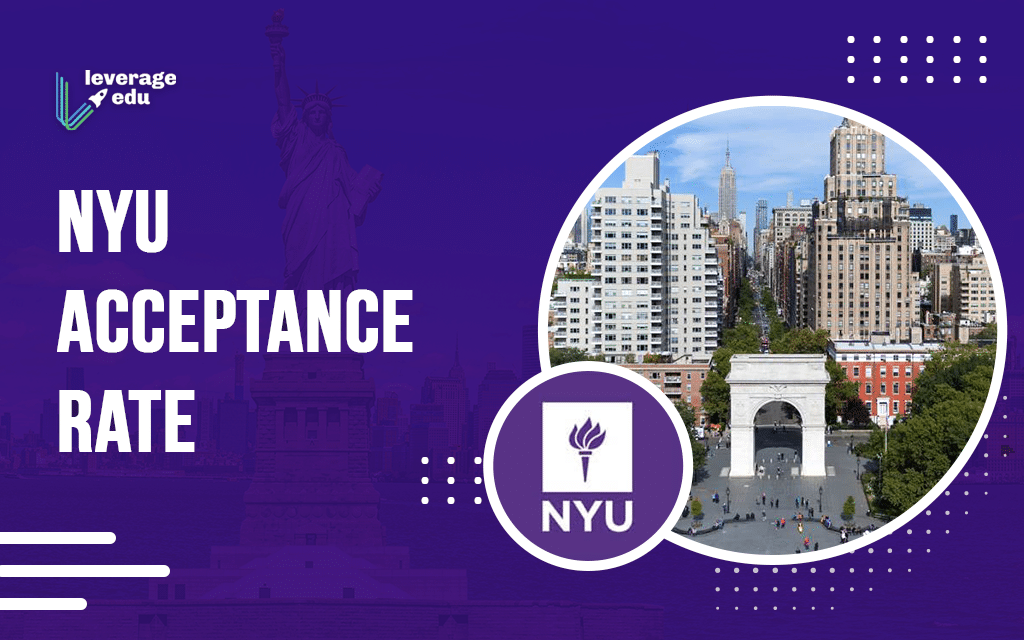NYU Acceptance Rate, or New York University, is a private research university located in New York City, one of the most populous and culturally diverse cities in the world. With over 50,000 students enrolled across its various campuses, NYU is known for its academic excellence, global reach, and innovative research programs.
However, gaining admission to NYU Acceptance Rate can be a highly competitive process, with thousands of applicants vying for a limited number of spots. In the past, NYU Acceptance Rate has varied depending on the program and campus. For example, in 2020, the overall NYU acceptance rate for NYU was around 15%, with the NYU acceptance rate for its highly selective Tisch School of the Arts as low as 5%. These numbers may seem daunting, but it’s important to remember that NYU acceptance rate only provides a snapshot of the competition, and each application is evaluated holistically.
NYU’s admission process takes into consideration various factors beyond just academic achievements, such as extracurricular activities, essays, letters of recommendation, and personal background. The university also has a strong commitment to diversity, equity, and inclusion, and strives to create a student body that reflects the richness and complexity of the world around us.

When interpreting NYU Acceptance Rate, it’s also worth considering trends over time and how they may be influenced by factors such as changes in admission policies or shifts in applicant pools. In recent years, NYU Acceptance Rate has seen a steady increase in applications, which may partly explain the decline in NYU acceptance rate. However, the university has also been making efforts to expand access and affordability through initiatives such as the NYU Go Local program, which offers in-state tuition rates to eligible students from neighboring states.
In summary, NYU’s admission process is multifaceted and highly competitive but also takes into account a range of personal and academic factors. While NYU acceptance rate may seem low, they do not necessarily reflect the full picture of what it takes to get into NYU, and the university’s commitment to diversity and inclusion means that it values a wide range of backgrounds and experiences.
Analyzing the Factors that may affect NYU Acceptance Rate

NYU Acceptance Rate can be influenced by a range of factors, including its location, academic reputation, and program competitiveness.
Location is an important consideration for many prospective students, and NYU’s prime location in the heart of New York City is a major draw for many applicants. However, this location can also be a double-edged sword, as the high cost of living and competition for housing may deter some students from applying. Additionally, NYU’s presence in a densely populated and diverse city may make it attractive to certain student populations while less appealing to others.
Academic reputation is another key factor that can influence NYU acceptance rate. The university is well-known for its strong programs in fields such as business, arts and humanities, and social sciences, and has a reputation for academic excellence. This reputation can attract a large pool of highly qualified applicants, which in turn may make the admission process more competitive. However, it’s worth noting that academic reputation is not the only factor that determines admission decisions, and each application is evaluated holistically.
Program competitiveness is a third factor that can play a role in NYU’s acceptance rate. Certain programs, such as the Tisch School of the Arts, have a reputation for being highly selective and admitting only a small number of students each year. Other programs may be less competitive but still attract a large number of applicants, creating a high demand for limited spots. The competitiveness of a program can be influenced by factors such as its prestige, faculty, and resources.
Other factors that may affect NYU’s acceptance rate include the university’s commitment to diversity and inclusion, its financial aid policies, and changes in the applicant pool or admission policies over time. While these factors can make it challenging to predict NYU’s acceptance rate in any given year, they also reflect the complexity and nuance of the admission process, which takes into account a wide range of factors beyond just GPA or test scores.
In summary, NYU’s acceptance rate can be influenced by a range of factors, including its location, academic reputation, and program competitiveness. However, each application is evaluated holistically, and there is no single formula for gaining admission to NYU. As a result, it’s important for prospective students to focus on presenting themselves as well-rounded individuals with unique experiences and perspectives.
Comparing NYU’s acceptance rate to other universities in the same region or field of study
Comparing NYU’s acceptance rate to other universities in the same region or field of study can provide insight into how competitive the university’s admission process is relative to its peers.
For example, in the New York City area, other universities such as Columbia University and Barnard College have acceptance rates of around 5-6%, making them even more selective than NYU. In contrast, other universities in the region such as Fordham University and Pace University have acceptance rates closer to 50%, indicating a much less competitive admissions process.
In terms of field of study, NYU is known for its strong programs in fields such as business, arts and humanities, and social sciences. Comparing NYU’s acceptance rate to other top-ranked universities in these fields can provide a sense of how competitive NYU’s admissions process is relative to its peers. For example, in the field of business, other top-ranked universities such as the University of Pennsylvania’s Wharton School and Stanford University have acceptance rates of around 6-7%, which is similar to NYU’s overall acceptance rate.
However, it’s important to note that acceptance rates only provide a snapshot of the admissions process and do not necessarily reflect the quality of education or student experience at a given university. Additionally, each university has its own unique strengths, weaknesses, and admission criteria, which can make direct comparisons difficult.
Ultimately, when choosing a university, it’s important to consider a range of factors beyond just acceptance rate, such as academic offerings, location, campus culture, and financial aid policies. While NYU’s acceptance rate may be lower than some of its peers, the university’s commitment to diversity, equity, and inclusion, as well as its global reach and innovative research programs, make it a highly desirable destination for many students.
Highlighting success stories of students who have been accepted to NYU
Highlighting the success stories of students who have been NYU Acceptance Rate can provide insight into what it takes to stand out during the admissions process.
For example, one student who was accepted to NYU’s Tisch School of the Arts credits their success to their dedication and passion for their craft. They had been involved in theater and film since a young age and had amassed an impressive portfolio of work, including short films and stage productions. They also had strong grades and test scores, but they believe it was their creative work that ultimately set them apart and demonstrated their potential to succeed in Tisch’s highly competitive programs.
Another student who was accepted to NYU’s Stern School of Business had a more unconventional path to admission. They had struggled with standardized tests and did not have a traditional academic background, but they had a track record of entrepreneurship and had started their own successful business while still in high school. They used their application to showcase their entrepreneurial spirit and real-world experience, and were able to convince the admissions committee that they had the potential to succeed in Stern’s rigorous program.
Other successful NYU applicants have emphasized the importance of demonstrating their unique qualities and perspectives in their applications. For example, one student who was accepted to NYU’s College of Arts and Science wrote a personal essay about growing up as a first-generation immigrant and the challenges they faced as a result. They used this essay to showcase their resilience, determination, and cultural heritage, and to demonstrate how these qualities would contribute to NYU’s diverse and dynamic student body.
Overall, successful NYU applicants have demonstrated a range of qualities and experiences, from academic excellence to creative work to real-world experience and unique perspectives. While there is no single formula for gaining admission to NYU, these success stories demonstrate that a strong application can showcase a wide range of skills and accomplishments and that each applicant has the potential to stand out in their own way.
the role of standardized tests
Standardized tests such as the SAT or ACT have long been a staple of the college admissions process, including at NYU. However, there has been growing debate in recent years about the role and relevance of these tests in today’s higher education landscape.
On one hand, standardized tests can provide a measure of academic achievement that is standardized across a wide range of students and schools. This can help universities like NYU to compare applicants from different backgrounds and regions and to ensure that admitted students meet a certain level of academic proficiency. Additionally, standardized tests can provide valuable information about a student’s aptitude for certain subjects or fields of study, which can be helpful in making admissions decisions for specific programs.
However, standardized tests have also been criticized for a variety of reasons. For example, they may be biased against certain populations, such as low-income students or students from non-English speaking backgrounds, who may not have access to the same resources or test preparation as their peers. Additionally, some argue that standardized tests are not always an accurate reflection of a student’s potential or ability, and may unfairly advantage students who are good test takers but may not excel in other areas.
In response to these concerns, many universities including NYU have adopted test-optional policies, which allow students to choose whether or not to submit standardized test scores as part of their application. This can help to level the playing field for students from diverse backgrounds and to focus on other aspects of the application, such as extracurricular activities, essays, and personal backgrounds.
While standardized tests are still a part of NYU’s admissions process for many programs, the university has made efforts to consider a range of factors beyond just test scores. For example, NYU has emphasized the importance of diversity and inclusion in its admissions process and has committed to creating a student body that reflects the richness and complexity of the world around us. Additionally, NYU has sought to expand access and affordability through initiatives such as the NYU Go Local program, which offers in-state tuition rates to eligible students from neighboring states.
In summary, while standardized tests such as the SAT or ACT have traditionally played a role in NYU’s admissions process, their relevance and importance are increasingly being questioned in today’s higher education landscape. While these tests can provide valuable information about a student’s academic proficiency, they may also be biased and not always an accurate reflection of a student’s potential. As a result, NYU and other universities are adopting test-optional policies and focusing on a range of factors beyond just test scores to ensure a diverse and talented student body.
Examining NYU’s efforts to increase diversity and inclusion within its student body
NYU has made significant efforts in recent years to increase diversity and inclusion within its student body, reflecting a broader trend in higher education towards creating a more equitable and inclusive learning environment.
One key strategy that NYU has employed is increasing outreach and support for underrepresented student populations, including low-income students, first-generation students, and students from historically marginalized communities. For example, NYU has established a range of scholarship programs and financial aid packages aimed at reducing financial barriers to admission and making higher education more accessible to a wider range of students. Additionally, NYU has established a number of student-led organizations and support networks designed to foster a sense of community and belonging for diverse student populations.
These efforts to increase diversity and inclusion may have an impact on NYU Acceptance Rate in a number of ways. On one hand, by actively recruiting and supporting underrepresented student populations, NYU may be able to attract a wider pool of highly qualified applicants who might not have otherwise considered the university. This can help to increase the overall competitiveness of the admissions process and may result in a lower NYU Acceptance Rate. Additionally, by prioritizing diversity and inclusion in its admissions decisions, NYU may be able to create a more diverse and dynamic student body that is better equipped to engage with the complex and interconnected challenges of our world.
However, it’s worth noting that diversity and inclusion efforts are not simply about lowering or raising acceptance rates. Rather, they are part of a broader effort to create a more equitable and just learning environment that reflects the richness and diversity of the world around us. As such, NYU’s efforts to increase diversity and inclusion should be understood as part of a broader commitment to social justice and equity, rather than simply as a means to an end.
In summary, NYU’s efforts to increase diversity and inclusion within its student body are an important part of the university’s mission and reflect a broader trend in higher education toward creating a more equitable and just learning environment. While these efforts may impact acceptance rates in some ways, their primary goal is to create a student body that is better equipped to engage with the complex and interconnected challenges of our world.
the pros and Cons of NYU’s selective admission policies
NYU’s selective admission policies have both pros and cons and can impact various aspects of student life including mental health and campus culture.
One of the main advantages of a selective admission policy is that it can attract highly motivated and talented students who are committed to academic achievement and intellectual inquiry. These students may bring a level of academic rigor and intellectual curiosity to the campus community that can benefit all students, and may also be more likely to contribute to research and other scholarly activities.
However, the downside of a selective admission policy is that it can create a highly competitive and potentially stressful campus environment, particularly for students who may already be struggling with mental health issues. The pressure to succeed academically and compete with other students can be overwhelming and may contribute to a culture of stress and anxiety that can have negative impacts on student well-being.
Additionally, a highly selective admissions policy can create a campus culture that is homogeneous and lacking in diversity, particularly if the admissions process is not structured to prioritize diversity and inclusion. This can create a campus environment that is less vibrant and dynamic than it could be, and may limit the opportunities for students to engage with a range of perspectives and experiences.
On the other hand, a less selective admissions policy may result in a more diverse and inclusive campus environment, but may also attract students who are less academically prepared or motivated. This can create challenges for faculty and staff who may need to provide additional support and resources to help these students succeed academically.
Overall, NYU’s selective admission policies have both pros and cons and can impact various aspects of student life including mental health and campus culture. While a highly selective admissions policy may attract highly motivated and talented students, it can also create a competitive and potentially stressful campus environment that may not be conducive to student well-being. Conversely, a less selective admissions policy may result in a more diverse and inclusive campus environment, but may also create challenges in terms of academic preparedness and support. Ultimately, the best admissions policy for NYU Acceptance Rate will depend on a range of factors including the university’s mission, goals, and values.
how NYU’s acceptance rate has been affected by the COVID-19 pandemic
The COVID-19 pandemic has had a significant impact on many aspects of higher education, including NYU’s admissions process and acceptance rate.
One of the most notable changes to the admissions process at NYU during the pandemic has been the move towards a test-optional policy, allowing students to decide whether or not to submit standardized test scores as part of their application. This was in response to the challenges posed by the pandemic, including disruptions to in-person testing and the potential for bias in online testing. By adopting a test-optional policy, NYU was able to create a more equitable admissions process that considered a wider range of factors beyond just test scores.
The pandemic also led to changes in the way that admissions decisions were made at NYU. With in-person visits and interviews canceled or limited, admissions committees had to rely more heavily on application materials such as essays, extracurricular activities, and letters of recommendation to make their decisions. This shift towards a more holistic admissions process may have contributed to changes in acceptance rates, as admissions committees were able to consider a wider range of factors beyond just test scores or academic achievement.
Overall, it’s difficult to say how exactly the COVID-19 pandemic has impacted NYU’s acceptance rate, as there are many factors at play. However, the move towards a test-optional policy and the shift towards a more holistic admissions process may have contributed to changes in the acceptance rate. Additionally, the pandemic has highlighted the importance of flexibility and adaptability in higher education, and NYU’s response to the pandemic may provide important lessons for the future of admissions and higher education more broadly.
advice and tips for prospective NYU applicants
For prospective applicants to NYU, there are a number of strategies that can help to increase your chances of being accepted to the university.
One of the most important things to keep in mind is that NYU values a well-rounded and diverse student body, and seeks applicants who have a wide range of interests and experiences. This means that it’s important to not only focus on academic achievement, but also to engage in extracurricular activities, volunteer work, and other pursuits that demonstrate your passions and interests outside of the classroom. These activities can also help to demonstrate qualities such as leadership, teamwork, and initiative that are highly valued by admissions committees.
Another important component of the NYU application is the personal statement, which provides an opportunity to showcase your writing skills and demonstrate your fit with the university’s mission and values. It’s important to take the time to craft a strong and compelling personal statement that highlights your unique qualities and experiences, and that demonstrates your passion for the field of study you wish to pursue.
Additionally, it’s important to take advantage of any opportunities to connect with NYU admissions representatives and learn more about the university’s programs and resources. This may include attending college fairs, visiting campus (either in person or virtually), and reaching out to current students or alumni for insights and advice.
Finally, it’s important to be strategic and thoughtful about the programs and majors that you apply to at NYU. While it’s important to pursue your passions and interests, it’s also important to consider the competitiveness of different programs and to ensure that you have a strong academic record and qualifications for the programs you are interested in.
Overall, the key to increasing your chances of being NYU Acceptance Rate is to demonstrate your passion, engagement, and fit with the university’s mission and values. By engaging in extracurricular activities, crafting a strong personal statement, connecting with admissions representatives, and being strategic in your program selection, you can position yourself as a strong and competitive applicant to this prestigious university.
the impact of NYU’s acceptance rate
NYU’s acceptance rate can have a significant impact on the university’s overall reputation, as it is often seen as a marker of the university’s selectivity and competitiveness.
A low acceptance rate can be seen as a sign of prestige and exclusivity and can help to enhance the university’s reputation and desirability among prospective students and faculty. It can also contribute to a more competitive and dynamic campus environment, as students are drawn from a highly talented and motivated applicant pool.
However, a low acceptance rate can also create challenges for the university, particularly in terms of diversity and inclusion. A highly selective admissions process can limit the diversity of the student body and may create a campus culture that is homogeneous and lacking in perspective.
Additionally, a low acceptance rate can make it difficult for the university to meet its enrollment targets and ensure a sustainable financial model. As such, there may be pressure to increase the acceptance rate, particularly if the university is facing financial or enrollment challenges.
Overall, NYU’s acceptance rate is an important factor in the university’s reputation and competitiveness and can influence future admission decisions and strategies. While a low acceptance rate can enhance the university’s prestige and competitiveness, it’s important to balance this against the need for a diverse and inclusive campus environment and a sustainable financial model. As such, future admission decisions and strategies should be grounded in careful consideration of the university’s mission, goals, and values, as well as the needs and interests of its various stakeholders.
conclusion
In conclusion, NYU’s acceptance rate is an important factor in the university’s reputation and competitiveness and can have a significant impact on various aspects of student life, including mental health and campus culture. While a low acceptance rate can enhance the university’s prestige and competitiveness, it’s important to balance this against the need for diversity and inclusion, as well as a sustainable financial model.
Prospective applicants to NYU Acceptance Rate can increase their chances of being accepted by engaging in extracurricular activities, crafting a strong personal statement, and being strategic in their program selection. Additionally, it’s important to take advantage of opportunities to connect with admissions representatives and to learn more about the university’s programs and resources.
Moving forward, it will be important for NYU Acceptance Rate to carefully consider its admissions decisions and strategies in light of its mission, goals, and values, as well as the needs and interests of its various stakeholders. By prioritizing diversity, inclusion, and a sustainable financial model, NYU can continue to build its reputation and attract highly talented and motivated students from around the world.
FAQ
Q: What is NYU’s current acceptance rate?
A: NYU’s current acceptance rate is around 15%.
Q: Does NYU require standardized test scores for admission?
A: NYU has adopted a test-optional policy, allowing students to decide whether or not to submit standardized test scores as part of their application.
Q: What programs and majors is NYU known for?
A: NYU is known for a wide range of programs and majors, including business, performing arts, journalism, and international studies.
Q: What is NYU’s stance on diversity and inclusion?
A: NYU is committed to promoting diversity and inclusion, and has implemented a range of initiatives and programs to support underrepresented groups on campus.
Q: What can I do to increase my chances of being accepted to NYU?
A: To increase your chances of being accepted to NYU, you should engage in extracurricular activities, craft a strong personal statement, and be strategic in your program selection. Additionally, it’s important to take advantage of opportunities to connect with admissions representatives and to learn more about the university’s programs and resources.
Q: How does NYU’s acceptance rate compare to other universities?
A: NYU’s acceptance rate is lower than many other universities, particularly those that are highly selective and competitive.
Q: How has the COVID-19 pandemic impacted NYU’s admissions process?
A: The COVID-19 pandemic has led to changes in NYU’s admissions process, including the adoption of a test-optional policy and a shift towards a more holistic admissions process that considers a wider range of factors beyond just test scores or academic achievement.

